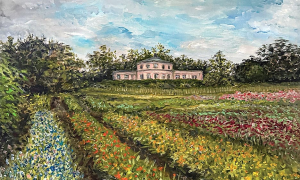Pianist’s second outing with his California-based trio is a vibrant and imaginative exploration of the creative spirit.
Bass says that Vol. 2 elevates everything the Trio did on Vol. 1 to a new level. It's a deeper, more mature effort by the Trio regarding the three things that made Vol. 1 a success: the wide spectrum of styles, the vibrant 3-way communication, and the unique arrangements of challenging compositions. On The Trio Vol. 2, they offer up a set of performances that are as tight as if the band had been playing together for decades, while, in truth, they first came together just over three years ago, just prior to recording Vol. 1. Once again, the level of synergistic communication between the three band members—in addition to Bass, the trio includes Kerry Kashiwagi on bass and Scott Gordon on drums—is virtually telepathic, lending a strong foundation to the entire structure of the recording.
The album contains 13 tracks, a mix of covers and original compositions, including a re-working of Bass’ own “Baltic Bolero,” from 2012’s NYC Sessions (Whaling City Sound.) When Bass happened to run into guitarist Barry Finnerty (Miles Davis, The Crusaders, The Brecker Brothers), he asked him to play on the track, and his solo, according to Bass, added a different flavor, some “spice” to it.
Another track from NYC Sessions given a “makeover” by The Trio is “The Sixties.” “You can really feel the spirit of the decade on this track,” says Bass. “The opening section’s disruptive feel captures the turbulent spirit of the early part of those years while the second part of the song is much more reflective of the peace and love of the latter part of the decade.”
Two additional Bass originals are also featured on the album—the lighthearted, sprightly “May,” which seems to celebrate spring and is notable for standout solos from all three players; “Yugen,” which captures the essence of the word’s meaning— the realization of the depth and beauty of the universe through its obfuscation – with subtle phrasing and a rather spare pacing.
As he has on his previous releases, Bass’ choice of covers on The Trio Vol. 2 pays tribute to both the well-known (Thelonious Monk, Bud Powell) and lesser known (Andrew Hill, Paul Bley, Denny Zeitlin) pianists who have influenced him throughout his career.
The album opens with “El Cordobes.” While inspired by Paul Bley’s many versions of the song, the Trio’s version, which combines dicey rhythmic precision with a footloose feel, manages to maintain the essence of its Spanish inspiration as this new iteration takes the song in its own singular direction. “El Cordobes,” along with Bud Powell’s “Tempus Fugit,” Frank Emilio Flynn’s “Gandinga, Mondongo y Sandunga," and Monk’s “Four in One” are arguably four of the most challenging pieces that The Trio could have opted to include on their sophomore outing, but their willingness to engage, and in fact conquer, those challenges speak to the level of confidence in themselves as a group, fostered by that unspoken communication, that The Trio have developed since their first release.
Their range is strikingly evident on the subtle “Black Monday” through to the buoyant “Carole’s Garden,” and, while it might seem that Bass is developing a horticultural theme as the album’s tracks segue to “Green Leaves of Summer,” he is quick to explain otherwise. “Of all the songs on the album, I feel that here is where I’m playing most romantically,” he says. On a less romantic note, with “I Fall in Love Too Easily” The Trio musically depicts Sammy Cahn’s dejected lyrical intent on a quiet, smoky-bar track.
There are hundreds of versions of Victor Young’s 1945 song “Love Letters,” by everyone from Elvis to Peggy Lee to Sammy Davis to Diana Krall to Joe Walsh to Bonnie Raitt and Elton John. The Trio’s take here is possibly the most original of them all, lively where most are dreamy, vibrant where most are gentle.
The album concludes with “Gandinga, Mondongo y Sandunga,” which Bass says continues his love affair with Afro-Cuban music and with taking on unique challenges. Barry Finnerty again joins the trio on guitar on this bold take on Frank Emilio Flynn’s 1959 song as The Trio’s staking out a musical claim. “This is a classic Cuban tune and, and given its unique rhythmic roadmap, not easy to pull off—especially without adding a percussionist, but along with Barry, the Trio here presents a version with energy, enthusiasm and elan!" says Bass.
For more information contact GoMedia PR.












![Full Moon [Feat. New York Voices, Mark Egan]](https://s3.amazonaws.com/allaboutjazz/coverart/large/a07a6f1d5edcd6c801f0e1c3b527da37.jpg)



















